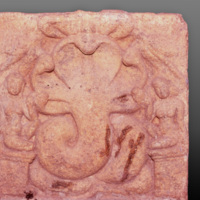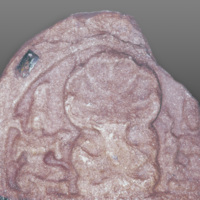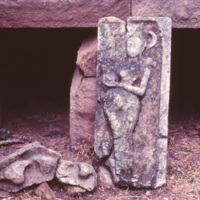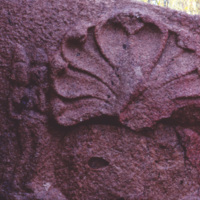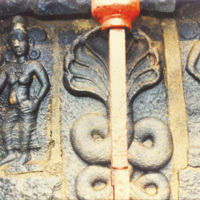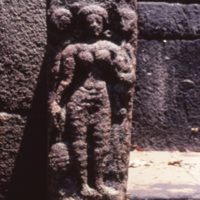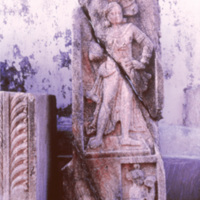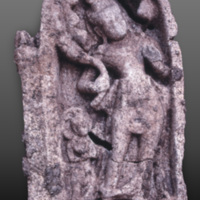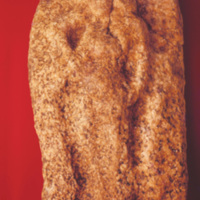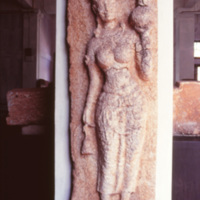Main Menu
AORC Libraries
Browse Items in Nagas (cobras) and naginis (female cobras) as guardians (13 total)
Cobra-guardians
Description: Nagas (cobras) and naginis (female cobras) as guardians: Nagas (cobras) are a clearly identifiable set of guardians of mostly Buddhist establishments and sometimes of secular structures such as tanks. This stone relief of a naga (cobra) with his two female companions on either side is said to be from Polonnaruva, Sri Lanka. It is now at the Colombo National Museum. Scholars have suggested a date in the early Polonnaruva period (ca. 10th-11th century A.D.).
Contributor: Co-Author: Seneviratna, Harsha
Collection: Women in Sri Lankan Sculpture and Painting
Six hooded cobra-guardian with consorts sporting a single hood
Description: A sculpture of a naga (cobra) of unknown date, at the Colombo National Museum, is this lime stone relief, flanked by two naginis (female cobras) with single hoods. The naginis are supportive of the central cobra.
Contributor: Co-Author: Seneviratna, Harsha
Collection: Women in Sri Lankan Sculpture and Painting
Female cobra-guardian
Description: This nagini (female cobra) relief with a single cobra hood on the side of her head lies near an old sluice at Eruvava in the Anuradhapura district, Sri Lanka. A few pieces of the central male cobra lie scattered in the area and the second female companion is missing. The sculpture is in a very wasted condition, but it is clear that she flanked the naga (cobra) on his left. The sculpture may be dated to the middle Anuradhapura period (ca. 6th-7th century A.D.) according to archaeologists.
Contributor: Co-Author: Seneviratna, Harsha
Collection: Women in Sri Lankan Sculpture and Painting
A single hooded cobra-guardian
Description: A nagini (female cobra) sculpture carved on a rock surface is found at an abandoned sluice near the Vannammaduva tank, in the Anuradhapura district, Sri Lanka. The stone on the cobra’s left is damaged. It is possible that there was a second female companion on this side. A date in the Anuradhapura period (4th century A.D. to 10th century A.D.) has been conjectured by scholars.
Contributor: Co-Author: Seneviratna, Harsha
Collection: Women in Sri Lankan Sculpture and Painting
Two cobra-guardians carrying pots of plenty.
Description: This well preserved example of female companions or naginis (female cobras) in tank sculpture can be seen at a sluice on the Manankattiya tank, east of Anuradhapura, Sri Lanka. The details of dress and ornament can be clearly seen in this carving on hard stone. A date in the middle Anuradhapura period (ca. 6th-7th century A.D.) has been suggested by scholars.
Contributor: Co-Author: Seneviratna, Harsha
Collection: Women in Sri Lankan Sculpture and Painting
Male and female cobras guarding a pond
Description: Flanking the steps on two opposites sides of a pond at Galabadda in the Monaragala district, Sri Lanka, are two male and two female relief figures in stone, facing each other. Each of them carries a flowering pot and what appears to be a water vessel. Associated with a water resource, this may be an instance of a nagini (female cobra) guardian, although there are no cobra hoods on any of the images. A date in the 12th century A.D. has been suggested by scholars, for the ruins at Galabadda, Sri Lanka.
Contributor: Co-Author: Seneviratna, Harsha
Collection: Women in Sri Lankan Sculpture and Painting
Naga couples
Description: The nagas (cobras in human form) as guardians of Buddhist temples is a widespread phenomenon. The number of hoods demonstrates the relative status of males and females. This limestone relief sculpture on a stele from a vahalkada of the Abhayagiri stupa at Anuradhapura, Sri Lanka, shows a many-hooded naga (cobra) with his female companion. Sporting a single hood, the nagini (female cobra) is relegated to a lower niche. The stone slab, carved around the 2nd century A.D., is found behind the main shrine of the Abhayagiri stupa.
Contributor: Co-Author: Seneviratna, Harsha
Collection: Women in Sri Lankan Sculpture and Painting
Female cobra-guardian with three hoods.
Description: In Sri Lanka, sculptured figures on guardstones are largely male. In this cobra guardstone, the limestone relief shows a nagini (a female cobra) characteristically diminutive in size but with three cobra hoods instead of the usual single hood. This suggests an improved status relative to other female cobras. The image is in the Abhayagiri Vihara Cultural Triangle Project office at Anuradhapura, Sri Lanka. Scholars associated with the project attribute the relief to the middle Anuradhapura period (5th-7th century A.D.).
Contributor: Co-Author: Seneviratna, Harsha
Collection: Women in Sri Lankan Sculpture and Painting
Nagini guardstone
Description: A guardstone with only the nagini (female cobra) is among the exhibits of the Archaeological Museum at Sigiriya, Sri Lanka. It was discovered in the Sigiriya gardens, with a companion nagini guardstone which has since disappeared. This 5th century A.D. limestone sculpture is in a deteriorated state but eye witnesses who have seen the cobra hood contributed to this identification.
Contributor: Co-Author: Seneviratna, Harsha
Collection: Women in Sri Lankan Sculpture and Painting
Nagini guardstone
Description: This stone relief sculpture of a woman carrying a pot and what looks like a bell is kept at the Colombo National Museum. A faint indication of a cobra hood over her head possibly represents a nagini (female cobra) guardian of the middle Anuradhapura period (ca. 5th-7th century A.D.). The original find spot of this sculpture is said to be Pidurangala, close to Sigiriya, Sri Lanka. A replica can be seen at the Archaeological Museum in Anuradhapura, Sri Lanka.
Contributor: Co-Author: Seneviratna, Harsha
Collection: Women in Sri Lankan Sculpture and Painting



